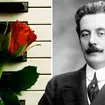Giacomo Puccini: Madama Butterfly
Hundreds of operas have tragedy at their core, but you would be hard pushed to find a more perfect example of this theme expressed in music than Puccini’s masterful opera Madama Butterfly.
It was a personal favourite of the composer, too; he once described it as ‘the most felt and most expressive opera that I have conceived’.
Madama Butterfly was both written at, and set during, the start of the twentieth century. But while Puccini wrote the opera in Italy, the location for the action is Japan. The opera tells the tale of the teenage geisha Cio-Cio San and her doomed marriage to Pinkerton, an American naval lieutenant. Puccini skillfully imbues the score with a mix of east and West. Highlights include the glorious love duet that falls at the end of Act I and the ravishing and pathos-filled soprano solo ‘Un Bel Di’ (‘One Fine day’), in which Butterfly steadfastly sings of her belief that Pinkerton will return to her.
Pinkerton does indeed return – but not to Butterfly. Instead, he is cruelly found to be in the company of his new, American wife. From this point on, Puccini focuses ever deeper on heartache, culminating in Butterfly committing suicide. Madama Butterfly: a tragic, troubling and pain-filled opera – but a glorious one at that.
Recommended Recording
Angela Gheorghiu (soprano) as Cio-Cio San; Jonas Kaufmann (tenor) as Pinkerton; Orchestra and Chorus of the National Academy of St Cecilia; Antonio Pappano (conductor). EMI Classics: 26418728.
















